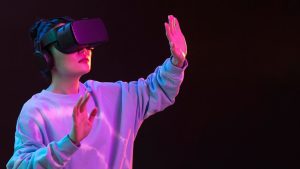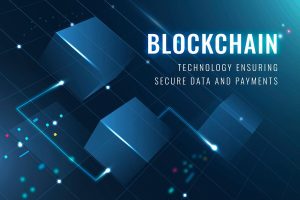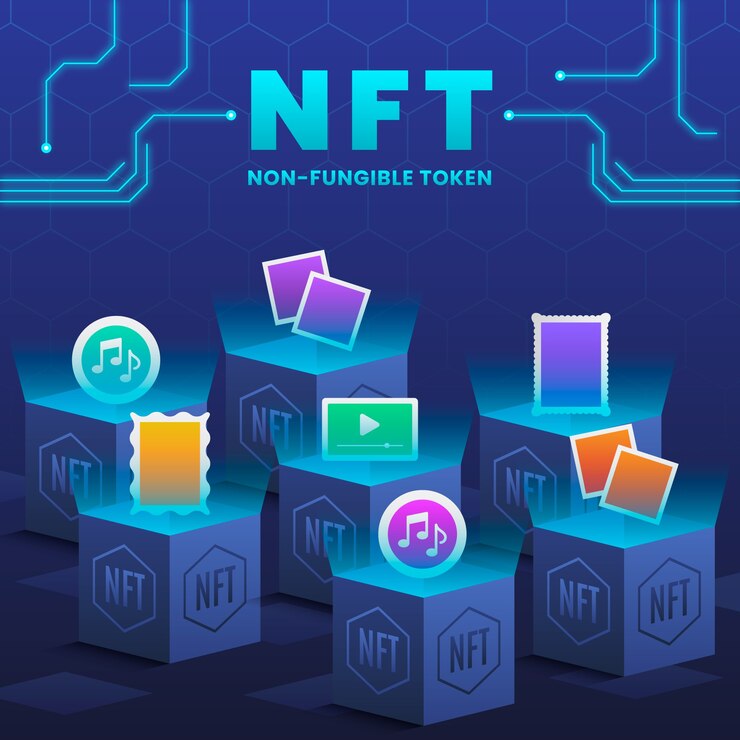The gaming industry has seen too many revolutions-the advent of 3D graphics, the rise in popularity of online multiplayer experiences today, it is blockchain technology, and Non-Fungible Tokens (NFTs). The latter can change the way we engage with and interact with digital worlds in blockchain-based games, adding ownership, transparency, and augmented reality to games.
In this blog post, we look at how blockchain is changing the gaming industry and what benefits could be seen to players and game developers, besides the role of augmented reality in that space.
What Are NFTs and Blockchain Games?
In order to understand how the blockchain is changing gaming, one must grasp the basic aspects of NFTs. This is unique, digital, on-blockchain items, a sort of decentralized ledger. While bitcoins or Ethereum work as a token, an NFT is unique and nonfungible.
In gaming, NFTs represent the ownership of characters, skins, weapons, and virtual land. Blockchain games integrate these tokens into their ecosystem, so people really own those assets rather than just renting them from game developers.
Advantages of NFT Gaming
- Ownership
Traditionally, developers own in-game items, and the rights of the player are limited to mere use. Blockchain games overturn this model entirely by giving ownership of assets in their entirety to the players. Players can, therefore, buy, sell, or even lease their NFTs, providing new revenue channels and adding practical value to the game.
- Interoperability
Blockchain supports cross-game and platform interoperability. Imagine a sword owned in one game; it can be used in another game. This is what NFTs deliver. This empowers players with a better gaming experience and encourages cross-game developers’ collaborations.
- Increased Transparency
Blockchain technology ensures transparency and fairness. All transactions are recorded on a public ledger, thus reducing fraud and ensuring that rare items remain truly rare. Players can trust the system without relying on a central authority.
- Play-to-Earn Opportunities
This would be quite interesting to see in blockchain gaming: the “play-to-earn” model, where players get cryptocurrency or NFTs for completing their tasks, leveling up, or winning battles, and could potentially turn gaming into a source of income, especially for developing countries.
- Augmented Reality Integration
Blockchain gaming goes to the next level with augmented reality, or AR, where the real and virtual worlds are combined. With blockchain games that use AR, gamers can interact with NFT assets in the real world for richer experiences. For instance, users can look for NFT treasures in their local neighborhoods or showcase their digital art collections in virtual galleries viewed through AR devices.

Challenges in Blockchain Game Development
While the potential of blockchain game development is massive, it has a set of challenges associated with it.
- High Entry Costs
Most blockchain games demand that the player buy NFTs or cryptocurrencies before they can play. This high barrier to entry deters casual gamers and limits the audience.
- Environmental Concerns
Blockchain technology, especially proof-of-work systems, has faced criticism for its environmental impact. However, newer blockchain models such as proof-of-stake have reduced energy consumption significantly.
- Complexity for New Users
Blockchain and cryptocurrency can be intimidating for players who are not familiar with these technologies. Developers need to focus on user-friendly interfaces to bridge this gap.
- Regulatory Uncertainty
The legal status of NFTs and cryptocurrencies varies across regions. Game developers must navigate these complex regulations to avoid potential pitfalls
The Future of NFT Gaming
The future of blockchain gaming seems pretty promising and more aligned with increased adoption in augmented reality and metaverse integration. The developers are focusing on reducing the entry costs, enhancing scalability, and improving access to attract more users.
You would expect much more from AR technology, which could give players real-world interactions with NFTs, like battling virtual monsters in your living room or going to a concert where your ticket is stored in your blockchain wallet.
Another trend in gaming is decentralized autonomous organizations. DAOs allow players to vote on decisions within the game. This means a player can now have a voice in the actual development and governance of the game.
Conclusion
NFT gaming is more than a trend; it’s a revolution in the making. It combines blockchain’s transparency and ownership with augmented reality’s immersive potential, making the future of gaming more interactive, rewarding, and inclusive than ever before. The possibilities are limitless as developers and players embrace this new era.For more details Contact us!
FAQs
About NFT Gaming
- What is NFT gaming?
NFT gaming is the utilization of non-fungible tokens in the representation of in-game assets. In this, an individual can own, trade, and monetize digital items. Most games supported by blockchain technology are mostly about NFT gaming.
- How does augmented reality enhance blockchain games?
Augmented reality offers another layer of immersion where virtual NFT assets are overlaid in the real world. Players can engage with their games and NFTs in real-world environments, making the game more immersive.
- Are blockchain games eco-friendly?
The early blockchain systems had enormous energy requirements; however, newer models, such as proof-of-stake, can be very sustainable. Developers are increasingly using these more sustainable and eco-friendly solutions.
- Can one earn money through NFT games?
Yes, many blockchain games offer play-to-earn opportunities in which players can earn cryptocurrency or valuable NFTs to complete tasks or win battles.
- Are blockchain games secure?
Blockchain technology is secure in itself by the decentralized and transparent nature of it. But players need to beware of scams and use only reputable platforms.


